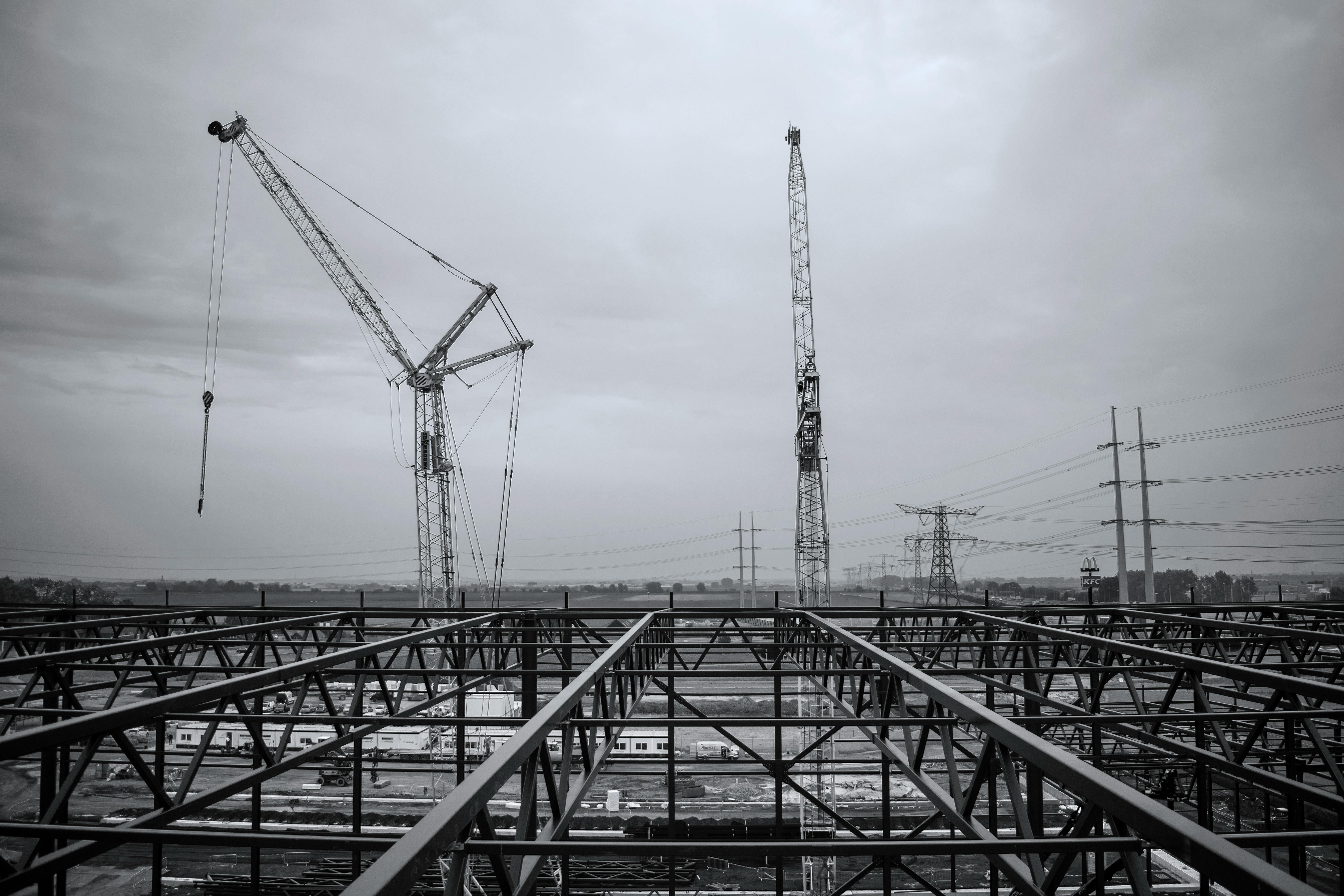Looking for a construction lawyer in Enoch, Utah? Look no further! This article is here to provide you with valuable information and guidance regarding common legal concerns in the construction industry. Whether you are dealing with contract disputes, construction defects, or other issues, our experienced attorney is ready to assist you. We understand the importance of prompt action, which is why we encourage you to call our phone number for more information and to seek the necessary legal assistance you need. Don’t navigate the complexities of construction law alone; let us help you resolve your legal concerns effectively and efficiently.

Overview of Construction Law
What is construction law?
Construction law is a specialized area of law that focuses on the legal aspects of the construction industry. It governs the rights and responsibilities of parties involved in construction projects, including contractors, subcontractors, suppliers, and property owners. Construction law encompasses a wide range of legal issues, including contract disputes, construction defects, payment disputes, mechanic’s liens, and delays and disruptions.
Importance of hiring a construction lawyer
Hiring a construction lawyer is crucial when dealing with legal matters in the construction industry. A construction lawyer has in-depth knowledge of construction law and can provide valuable advice and guidance throughout the construction process. They can help navigate complex legal issues, protect your rights and interests, and ensure compliance with relevant laws and regulations. By having a construction lawyer on your side, you can minimize risks, resolve disputes efficiently, and potentially save substantial amounts of time and money.
Key aspects of construction law
Construction law is multifaceted and covers various legal areas. Some key aspects of construction law include:
-
Construction contracts: Construction lawyers assist in drafting, negotiating, and reviewing construction contracts to ensure that terms and conditions are fair and legally sound.
-
Construction defects: Construction lawyers assist in addressing construction defects, which are faults or deficiencies in the construction project. They can help determine liability, seek compensation, and ensure that necessary repairs are made.
-
Payment disputes: Construction lawyers help resolve payment disputes between contractors, subcontractors, and property owners. They can enforce payment terms, initiate collection strategies, and pursue legal action if necessary.
-
Mechanic’s liens: Construction lawyers deal with mechanic’s liens, which are legal claims placed on a property to secure payment for materials or services provided. They can assist in filing, enforcing, or defending against mechanic’s liens.
-
Delays and disruptions: Construction lawyers help navigate issues related to delays and disruptions in construction projects. They can assess the impact of delays, pursue extension of time claims, and seek damages for delay-related losses.
Now that we have a basic understanding of construction law, let’s explore common legal concerns in the construction industry and how a construction lawyer can assist in addressing them.
Common Legal Concerns in the Construction Industry
Construction contracts
Construction contracts are the foundation of any construction project. They outline the rights and obligations of the parties involved, the scope of work, payment terms, and dispute resolution mechanisms. A construction lawyer can ensure that contracts are properly drafted, reviewed, and negotiated to protect your interests and minimize potential disputes.
Construction defects
Construction defects can have serious consequences for both contractors and property owners. They can lead to safety hazards, financial losses, and legal disputes. A construction lawyer can assist in identifying construction defects, evaluating liability, and pursuing remedies such as repairs, compensation, or warranties.
Payment disputes
Payment disputes often arise in the construction industry, with many contractors and subcontractors experiencing delays or non-payment for their work. A construction lawyer can help resolve payment disputes, enforce payment terms, initiate collection strategies, and pursue legal action if necessary.
Mechanic’s liens
Mechanic’s liens are legal claims placed on a property to secure payment for materials or services provided during the construction process. A construction lawyer can assist in filing and enforcing mechanic’s liens, protecting the rights of contractors and suppliers, or defending against unjust liens.
Delays and disruptions
Delays and disruptions can significantly impact construction projects, causing financial losses and potential legal disputes. A construction lawyer can help navigate delay-related issues, document impacts, pursue extension of time claims, and seek damages or liquidated damages as appropriate.
Now that we have discussed common legal concerns in the construction industry, let’s take a closer look at the role of a construction lawyer and how they can assist in addressing these concerns.
Role of a Construction Lawyer
Legal advice and counsel
One of the primary roles of a construction lawyer is to provide legal advice and counsel to clients engaged in construction projects. They can help interpret and apply construction laws, regulations, and contractual provisions. By seeking the guidance of a construction lawyer, you can make informed decisions, mitigate risks, and comply with legal requirements.
Contract drafting and negotiation
Construction lawyers play a vital role in drafting and negotiating construction contracts. They can ensure that contracts are clear, comprehensive, and favor their clients’ interests. Construction lawyers carefully review contract terms and conditions, anticipate potential issues, and negotiate fair and equitable agreements on behalf of their clients.
Construction litigation
In the unfortunate event of a construction dispute that cannot be resolved through negotiation or alternative dispute resolution methods, a construction lawyer can represent their clients in court. They have the knowledge and experience to navigate the complexities of construction litigation, gather evidence, present arguments, and advocate for their clients’ rights and interests.
Dispute resolution
A significant part of a construction lawyer’s role is to assist in dispute resolution. They can help parties involved in construction projects find amicable solutions through negotiation, mediation, or arbitration. Construction lawyers are skilled in alternative dispute resolution methods, aiming to minimize costs, time, and disruption.
Risk management
Construction projects inherently involve risks, and a construction lawyer can help identify and manage these risks effectively. They can assess contractual provisions, insurance coverage, and regulatory compliance to mitigate potential risks. By engaging a construction lawyer, you can proactively address risk issues, protect yourself against liabilities, and increase the likelihood of successful project outcomes.
Now that we understand the role of a construction lawyer, let’s explore how to choose the right construction lawyer for your specific needs.
How to Choose a Construction Lawyer
Experience and expertise
When choosing a construction lawyer, consider their experience and expertise in construction law. Look for lawyers who have significant experience handling construction-related cases and possess an in-depth understanding of the construction industry.
Reputation and track record
A construction lawyer’s reputation is an essential factor to consider. Research their reputation in the legal community and among clients by reading reviews and seeking referrals. Look for lawyers with a track record of successful outcomes and positive testimonials from satisfied clients.
Client testimonials
Client testimonials offer valuable insights into a construction lawyer’s abilities and professionalism. Look for reviews and testimonials from past clients to get an idea of the quality of service provided.
Communication and accessibility
Open communication and accessibility are critical when working with a construction lawyer. Choose a lawyer who is responsive, communicates clearly and promptly, and keeps you informed about the progress of your case.
Fees and billing
Discuss fees and billing arrangements upfront with potential construction lawyers. Transparency regarding fees is crucial to avoid financial surprises. Choose a lawyer who offers fair and reasonable fee structures, taking into account your specific needs and budget.
Now that we have discussed how to choose a construction lawyer, let’s delve into specific legal concerns in more detail and explore strategies for effectively navigating them.

Navigating Construction Contracts
Understanding the terms and conditions
Understanding the terms and conditions of a construction contract is vital before entering into any agreement. A construction lawyer can review the contract, explain the terms, and ensure that they align with your intentions and protect your interests.
Contract negotiation and amendments
Construction lawyers can assist in negotiating contract terms and conditions to ensure that they are fair and reasonable. They can identify potential pitfalls, propose amendments, and advocate for your interests during the negotiation process.
Breach of contract issues
Breach of contract occurs when one party fails to fulfill their obligations as outlined in the agreement. A construction lawyer can help identify breaches, assess damages, and pursue remedies such as specific performance or monetary compensation.
Enforcing contract rights
If disputes arise during the course of a construction project, a construction lawyer can aid in enforcing your contractual rights. They can initiate legal action, seek injunctions, or pursue other remedies to protect your interests.
Dispute resolution clauses
Construction contracts often include dispute resolution clauses that outline the methods for resolving conflicts. A construction lawyer can assist in negotiating these clauses, ensuring that they provide fair and efficient mechanisms for resolving disputes.
Addressing Construction Defects
Types of construction defects
Construction defects can manifest in different forms, such as structural issues, water infiltration, defective materials, or poor workmanship. A construction lawyer can help identify and classify construction defects based on their nature and extent.
Statutes of limitations
Statutes of limitations set specific timeframes within which a party can bring legal action for construction defects. A construction lawyer can ensure that you meet the deadlines for filing claims and pursuing remedies.
Proving construction defects
Proving construction defects in court requires comprehensive evidence and expert testimony. A construction lawyer can assist in gathering evidence, consulting with experts, and presenting a persuasive case to support your claims.
Seeking compensation
Construction defects can lead to significant financial losses. A construction lawyer can help evaluate damages, assess liability, and pursue compensation through negotiation, mediation, arbitration, or litigation.
Negotiating settlements
In some cases, parties may choose to pursue a settlement rather than engaging in lengthy and costly litigation. A construction lawyer can assist in negotiating fair and favorable settlements, protecting your rights and interests.
Resolving Payment Disputes
Contractual payment terms
Contractual payment terms are at the heart of payment disputes in the construction industry. A construction lawyer can review payment terms, ensure compliance, and take appropriate legal action if parties fail to meet their payment obligations.
Delays in payment
Delays in payment can have a significant impact on cash flow and project progress. A construction lawyer can help address delayed payment issues, pursue remedies such as late payment penalties, and seek expedited resolution to ensure fair compensation.
Collection strategies
When faced with non-payment, a construction lawyer can assist in implementing effective collection strategies. They can help you understand your rights, initiate demand letters, file liens or bond claims, and take legal action to recover the amounts owed.
Mediation and arbitration
Mediation and arbitration are alternative dispute resolution methods that offer a more streamlined and cost-effective approach than litigation. A construction lawyer can guide you through these processes, represent your interests, and work towards resolving payment disputes amicably.
Litigation for non-payment
When all other options fail, litigation may be necessary to recover unpaid amounts. A construction lawyer can represent you in court, present evidence, and advocate for your right to receive proper payment for your work or services.
Understanding Mechanic’s Liens
Overview of mechanic’s liens
Mechanic’s liens are powerful legal tools that enable contractors, subcontractors, and suppliers to secure payment for their work or materials. A construction lawyer can provide an overview of mechanic’s liens, explain their benefits, and guide you through the process of filing or defending against a lien.
Filing requirements
Filing a mechanic’s lien involves adhering to strict legal requirements. A construction lawyer can ensure that all necessary documentation is prepared accurately and filed within the specified timeframe to protect your interests effectively.
Enforcing mechanic’s liens
Once a mechanic’s lien is filed, it must be enforced to secure payment. A construction lawyer can guide you through the enforcement process, which may involve legal action, negotiations, or other resolution methods.
Bond claims and alternatives
In some cases, instead of filing a mechanic’s lien, contractors and subcontractors may have the option to make a bond claim. A construction lawyer can assess whether a bond claim is appropriate in your situation and guide you through the necessary steps.
Defending against mechanic’s liens
If you are faced with an unjust or excessive mechanic’s lien, a construction lawyer can assist in defending against it. They can evaluate the validity of the lien, dispute any wrongful claims, and protect your rights as a property owner.

Dealing with Delays and Disruptions
Causes of delays and disruptions
Delays and disruptions in construction projects can arise from various factors, including weather conditions, labor shortages, funding issues, or unforeseen circumstances. A construction lawyer can help identify the causes of delays and disruptions to determine liability and potential remedies.
Notice and documentation requirements
Proper notice and documentation are vital when dealing with delays and disruptions. A construction lawyer can assist in ensuring compliance with notice requirements, documenting impacts, and preserving necessary evidence to support delay-related claims.
Extension of time claims
When faced with significant delays, contractors and subcontractors may be entitled to extensions of time to complete their work. A construction lawyer can help assess the validity of extension of time claims and pursue appropriate remedies.
Acceleration claims
Acceleration claims arise when a project’s schedule is condensed or accelerated beyond its original timeframe. A construction lawyer can assist in evaluating acceleration claims, assessing damages, and pursuing compensation for the additional costs incurred.
Delay damages and liquidated damages
Delays in construction projects can result in financial losses for parties involved. A construction lawyer can help evaluate delay damages and liquidated damages provisions in contracts, negotiate fair outcomes, and seek reimbursement for losses suffered due to delays.
Alternative Dispute Resolution in Construction
Mediation as a dispute resolution method
Mediation is a voluntary and confidential process where a neutral third party facilitates negotiations between disputing parties. Construction lawyers often act as mediators, helping parties find common ground, explore creative solutions, and reach mutually acceptable agreements.
Advantages and disadvantages of mediation
Mediation offers several advantages in construction disputes, such as cost-effectiveness, flexibility, and the potential for preserving business relationships. However, it may not be suitable for all situations, especially if parties are unwilling to compromise or if there is a significant power imbalance.
Arbitration as an alternative to litigation
Arbitration is a more formal alternative to litigation, where an arbitrator or panel of arbitrators renders a binding decision after considering evidence and arguments presented by both parties. Construction lawyers can represent clients in arbitration proceedings, presenting their case and advocating for their interests.
The arbitration process
The arbitration process involves several stages, including the selection of arbitrators, submission of evidence, presentation of arguments, and the issuance of an arbitration award. A construction lawyer can guide you through the arbitration process, ensuring your rights are protected and your case is effectively presented.
Enforcing and challenging arbitration awards
Once an arbitration award is rendered, it must be enforced or challenged in court. A construction lawyer can assist in enforcing an arbitration award to ensure compliance or challenge an award that may be unfair or improper.
In conclusion, construction law encompasses various legal concerns in the construction industry, requiring specialized knowledge and expertise. Hiring a construction lawyer is essential for navigating complex legal issues, protecting your rights and interests, and ensuring compliance with construction laws and regulations. From contract drafting and negotiation to resolving payment disputes, addressing construction defects, and handling delays and disruptions, a construction lawyer plays a critical role in promoting successful project outcomes. When choosing a construction lawyer, consider their experience, reputation, communication style, and billing practices. With the guidance of a knowledgeable construction lawyer, you can navigate the intricacies of construction law with confidence and achieve the best possible results for your construction projects.